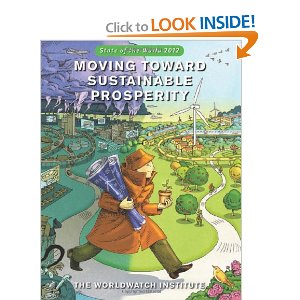
Lester Brown, Erik Assadourian, Michael Renner et al
4.0 out of 5 stars Inspiration for both policy makers, negotiators and me as “normal” civilian August 3, 2012
In the 2012 edition of its flagship report, Worldwatch.org celebrates the twentieth anniversary of the Rio de Janeiro 1992 Earth Summit with a far-reaching analysis of progress toward building sustainable economies. Written in clear language with easy-to-read charts, State of the World 2012 offers a new perspective on what changes and policies will be necessary to make sustainability a permanent feature of the world's economies. The Worldwatch Institute has been named one of the top three environmental think tanks in the world by the University of Pennsylvania's Think Tanks and Civil Societies Program.
The first part consists of 15-20 page articles reviewing recent sustainability developments, such as:
– green economy, work
– degrowth in developed countries, not to be interpreted as deliberately causing a crisis.
– inclusive and sustainable urban development (housing, public transport, public space, slums)
– sustainable transport
– information & communications technologies, enablers for livable, equitable, sustainable cities
– the western corporation reinvented (forget short-term shareholder value, foster sustainability)
– governance
To give even more examples of how sustainability goals can be reached, Part 2 delivers short articles (2-10 pages each) on:
– 9 population strategies to stop short of 9 billion people (from anticonception, education to removing work barriers)
– from light green to sustainable buildings (maybe we need thicker walls again)
– more-sustainable consumption
– mobilization of the business community (examples from Brazil)
– agriculture
– food security
– biodiversity: combating the 6th mass extinction of species
– ecosystem services
– local governmental structure
Statistics and world-wide practices in easy readable info boxes illustrate these core messages. Some of the articles are to the point, specific, measurable and realistic. Other articles are written from a more theoretical point of view, such as ecosystem services (e.g. what's the value of that nearby river or forest?). Inspiration for both policy makers, negotiators and me as “normal” civilian in The Netherlands.




